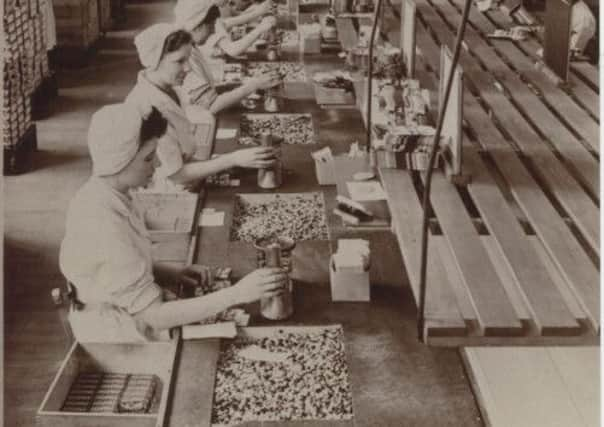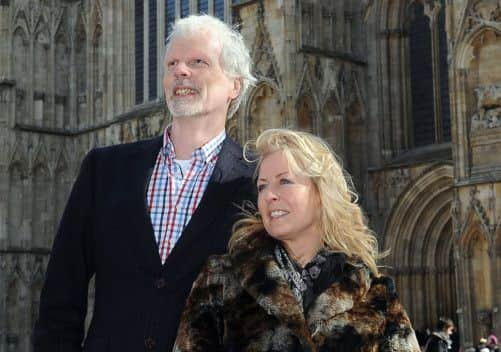Sweet memories


It sounds like it might just be Yorkshire’s answer to Call the Midwife.
There are no babies this time, just chocolate. Lots of chocolate, but reading Neil Hanson and Lynn Russell’s new book of five of the women who worked at Rowntree’s world famous factory in York it’s impossible not to be reminded a little of Jennifer Worth’s memoirs which became the basis for the hit television series.
Advertisement
Hide AdAdvertisement
Hide AdAll are very different characters – Maureen is the fiercely independent one who left her husband at a time when divorce was still taboo, then there’s the ever resilient Madge, one of 10 children, born in poverty when the First World War was still raging, for anyone who ever doubted the power of true love there’s Florence, and the quintet is completed by the shy retiring Dorothy and the doggedly hardworking Eileen. But they all share one thing in common. They worked at Rowntree’s and for all it was more than just a job.


The Sweethearts – Tales of Love, Laughter and Hardship from the Yorkshire Rowntree’s Girls has all the makings of Sunday evening drama, but for the moment at least the co-authors are focusing on the book rather than what might happen afterwards. “The one thing we do know is that these are great stories and it has been a real privilege to be able to tell them,” says Neil, a specialist social history author and writer in residence at York St John University. “The history of Rowntree’s the factory is well known, but we were always much more interested in the people and in particular the women who were key to making the business into one of the world’s best known confectioners.
“I never understand people who say our history is all about kings, queens and politicians. I have always been much more interested in the stories of ordinary men and women.”
Having put out appeals for help both on the radio and in various newspapers, Neil and Lynn waited to see what the response would be. Soon a trickle of calls turned into a flood. With enough material to fill a series of books, in the end, they decided to focus on just five women, but the memoir features the anecdotes of many more who passed through the imposing factory gates each morning.
Advertisement
Hide AdAdvertisement
Hide AdThose memories stretch from the 1930s to the 1980s when Rowntree’s was taken over by Nestlé. While the smell of chocolate still wafts over the city, the sale represented a landmark moment in the company’s history and certainly the workplace the Sweethearts remember is long gone.
“It’s a really fascinating period because it begins at a time when a woman’s right to vote had at least been established, but her right to choose her career path, manage her own money, live her own life and follow her own destiny was far from certain,” says Neil. “In the 1930s and the decades that followed, many of the women employed at Rowntree’s found a degree of financial independence, self-confidence and self-reliance through the money they earned at the factory.
“For some unhappy women, whose lives were blighted by poverty, illness, bad housing and sometimes even worse husbands, their working days at the factory also offered a much needed refuge and respite from their domestic turmoil – a place where they could be happy, respected and valued by their colleagues.”
The books is as much about the women’s personal lives as it as about their careers working on Rowntree’s production line and Neil and Lynn spent many months gaining the trust of the women who they wanted to feature in print.
Advertisement
Hide AdAdvertisement
Hide Ad“Often people think, ‘Well, why would anyone want to hear my story? I haven’t done anything special’,” says Lynn. “Our job was to convince them that the details of their lives were important and that they were worth recording. Those who remember Rowntree’s in its heyday are now in their 70s, 80s and 90s and we realised quite early on that there was really only a narrow window to record their memories for posterity.
“The factory was of central importance to York, but it also stands for more than that, it’s about the social history of this country. It’s easy to forget how much has changed over the last few decades, but when some of these women started working they came from homes which didn’t even have alarm clocks. They relied on the ‘knocker uppers’ who would walk the streets at dawn banging on windows with a large pole to make sure they got to the factory on time.”
While the founder of the company, Joseph Rowntree, lived by the Quaker philosophy and his workers benefitted from many perks that other factory workers could only dream of, in return they had to abide by a set of strict rules. So while the sprawling site and the model village of New Earswick boasted its own social club, library and allotments and while the women were encouraged to better themselves through Rowntree’s education programme, they also had to be clockwatchers. Those who were just two minutes late for the morning shift were locked out of the factory until lunchtime and their pay docked, uniforms were regularly inspected and while some occasionally sneaked a chocolate, eating any of the sweets which went by on the conveyor belt was strictly forbidden.
“The Rowntree family were incredible philanthropists, but they weren’t pushovers,” says Neil. “They did believe in looking after their workers, but this was a business and they always had one eye on productivity.”
Advertisement
Hide AdAdvertisement
Hide AdIn the book, Madge remembers the day she turned up for an interview at the factory aged just 14. Having completed an application form with details of her name, address, school she had attended and list of hobbies, the teenager was led into another room where two men and a woman was waiting. The three were wearing white lab coats and each carried a stopwatch and clipboard.
“They were industrial psychologists, whose role was to identify the most suitable new recruits for any given task” says Neil. “Industrial psychology was a still novel quasi-science which was much admired by Seebohm Rowntree who had succeeded his father as chairman and the aim was to increase productivity and as he saw it eliminate ‘all the unhappiness caused by what is popularly called putting the round peg in the square hole’.
“Potential employees like Madge had to complete a series of home-spun tests like matching shapes to the right holes on a wooden board and various colour recognition tests. Rowntree’s clearly thought they were doing the right thing by their workers, but you can only imagine how intimidating it must have been for these young girls.”
By the end of the 1930s, Rowntree’s employed more than 12,000 people working on its famous lines. Each week, the York factory was churning out thousands of KitKats, tubes of Smarties and boxes of Black Magic had ushered in a new luxurious chapter. With the outbreak of the Second World War, much of the operation was turned over to making munitions and for one of the women featured in the book it was a period which proved life-changing Florence Clark, who had joined Rowntree’s straight from school in 1923, stopped working in the mill which produced the company’s various packaging and instead became one of the “canary girls”, so called because the TNT powder they handled turned everything yellow.
Advertisement
Hide AdAdvertisement
Hide Ad“Our face, our hair, our hands, even the souls of our feet went yellow,” she says. “When you went out of the factory everyone would says, ‘Oh I know where you work’. At the time there were thousands of soldiers stationed around York and the workers were asked whether we would take their washing home.
“I ended up taking home a bundle belonging to a Corporal Davies. My mum obviously had a soft streak and unbeknown to me took to putting little gifts in with the clean washing like a biscuit or a packet of Woodbines.”
Florence’s mother eventually invited the unknown soldier to tea. It turned out he was not only pretty dashing, but also single and he and Florence eventually married and for 58 years lived happily ever after.
“Like a lot of the women, Florence was quite shy when we first met her,” says Lynn. “But her humour, energy and vitality is incredible. Like everyone we met, she has nothing but happy memories of working at Rowntree’s and we hope we have reflected that in our book.”
Advertisement
Hide AdAdvertisement
Hide AdThe Sweethearts by Lynn Russell and Neil Hanson is published by Harper Collins priced £6.99. To order a copy through the Yorkshire Post Bookshop call 01748 821122. The book will be launched at Waterstone’s in York on April 25 at 6.45pm. Tickets cost £3 and are available from the bookshop.